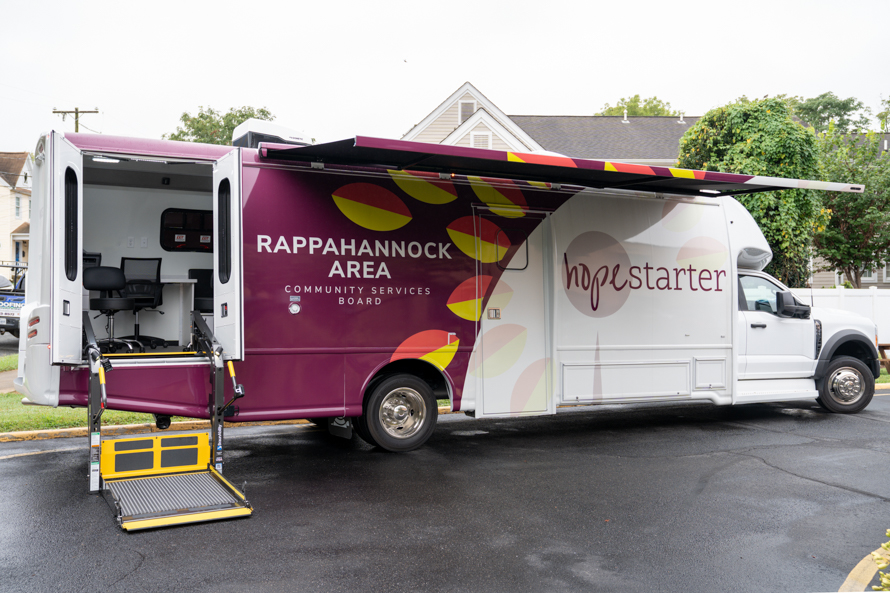When it comes to recovery, sometimes the hardest part is getting there.
For people living with opioid use disorder, barriers like transportation, distance, and stigma can make it difficult—or even impossible—to reach the care they need.
That’s why we’re hitting the road. We just rolled our Mobile Recovery Unit—a new program designed to bring life-saving care directly to the people and places that need it most.
The new unit will serve Caroline, King George, Spotsylvania, and Stafford counties, while also supporting our existing office-based opioid treatment services in the City of Fredericksburg.
The goal: to make recovery accessible, hopeful, and close to home.
Meeting People Where They Are
Last year, more than 1,000 Virginians lost their lives to opioid overdoses—including nearly 60 people in Fredericksburg and the surrounding counties that make up our service area.
While those numbers represent a decline from previous years, they still serve as heartbreaking reminders of the need to fight the opioid epidemic with all available tools.
“Each number represents a person—someone’s child, parent, friend, or neighbor,” said Executive Director Joe Wickens. “Even though we’re seeing some progress, we know that one life lost is one too many.”
Although the number of overdose deaths has declined, the need for accessible treatment remains urgent. The MRU is part of our ongoing effort to remove barriers to care and connect more people to the support they deserve—ultimately helping our community members find hope in situations that seem hopeless.
So Much More Than a Set of Wheels
A grant from the Opioid Abatement Authority funded the purchase of the MRU, which operates as an extension of our office-based opioid treatment program. The unit offers an evidence-based combination of intensive therapy and medications for opioid use disorder.
Decades of research have shown that medication for opioid use disorder (MOUD) saves lives and supports lasting recovery.
MOUD is one of the most effective, evidence-based tools in the fight against addiction. People who receive medications are twice as likely to remain in recovery and have a much lower risk of fatal overdose compared to those who do not receive medication.
Among people who stay engaged in treatment, about 50–60% achieve sustained remission or abstinence after a year of care—especially when medication is combined with counseling and recovery supports.
In fact, studies show that remaining in medication-assisted treatment **reduces the risk of death from opioid overdose by more than 50%.**
These numbers are more than statistics—they represent hope. Every individual who finds stability through medication-assisted treatment has the chance to rebuild their life, reconnect with loved ones, and rediscover purpose.
However, fewer than 20 percent of people with OUD currently receive medication-assisted treatment—a gap the MRU aims to close.
A Road Toward Hope
The MRU represents so much more than a new vehicle, providing a way to reach people with compassion and support. By meeting individuals where they are, we hope to make recovery more achievable and to continue reducing the toll of opioid use disorder across the region.
“No one’s road to recovery should be blocked by barriers like transportation or access to care,” said Clinical Services Director Jacque Kobuchi. “The MRU helps people stay on the path to healing, no matter where that road begins.”
The MRU also represents the power of partnership. The project was made possible through collaboration among state and local leaders, community partners, and our team of HopeStarters. We share a commitment to creating a community where every person has the opportunity to heal.
“Every mile this unit travels opens a new path to healing,” Wickens said. “It brings care, hope, and connection closer to home.”
Down the Road
As the MRU begins traveling throughout the region, we hope to connect with individuals who might not otherwise reach out for help—those who may be unhoused, isolated, or unsure where to begin.
“Recovery doesn’t always start with a grand gesture,” Kobuchi said. “Sometimes it starts with one small step—or in this case, one visit to a mobile unit parked in your county.”
We hope that bringing treatment directly into the community, more people will take that first step and will find that hope is always closer than it seems.
“Our message is simple,” Kobuchi added. “Recovery is possible, and hope is on the move.”
Starting Your Journey
Individuals interested in using the MRU to support their recovery will start with the clinic in their county of residence. They will receive an intake to make sure this will be an effective support for them.
The MRU will be in each locality on a certain day of the week:
- Monday, Stafford
- Tuesday, King George
- Wednesday, Spotsylvania
- Thursday, Caroline
Exact locations are still being determined, but the van will be available at the county clinics until a place has been found. In Spotsylvania County, the MRU will be at 4701 Market Street (formerly the Goodwill Building), which is adjacent to a Fredericksburg Regional Transit stop.
When you arrive for an appointment on the van, you will be able to access nursing care, peer supports, and a virtual session with a doctor.
Interested in services with the Mobile Recovery Unit? You can connect with the MRU by calling the clinic in your county:
- Caroline, 804-633-9997
- King George, 540-775-9879
- Spotsylvania, 540-582-3980
- Stafford, 540-659-2725

